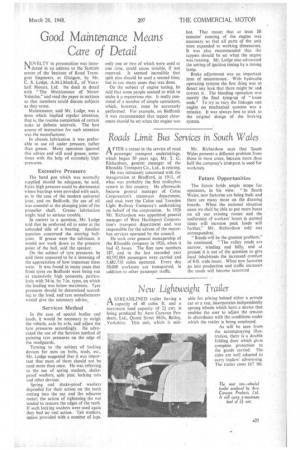Good Maintenance Means Care of Detail
Page 53

If you've noticed an error in this article please click here to report it so we can fix it.
N'yELTY in presentation was introduced in an address to the Scottish centre of the Institute of Road Transport Engineers, at Glasgow, by Mr. C. S. Lodge, A.M.I.Mech.E., of Vauxhall Motors, Ltd. He dealt in detail with "The Maintenance of Motor Vehicles," and read the paper in sections so that members could discuss subjects as they arose.
Maintenance, said Mr. Lodge, was a term which implied regular attention, that is, the routine completion of certain tasks at definite intervals. The best source of instruction for such attention was the manufacturer.
In chassis lubrication it was preferable to use oil under pressure, rather than grease. Many operators ignored this advice and still used grease, sometimes with the help of extremely high pressures.
Excessive Pressure
The hand gun which was normally supplied should be adequate, he said. Extra high pressure could be detrimental where bearings were provided with seals, as in the case of the modern universal joint, and on Bedfords, the use of oil was essential at the plunging joint of the propeller shaft. Grease lubrication might lead to serious trouble.
In answer to a question, Mr. Lodge said that he preferred oil to enter at the unloaded side of a bearing. Another question concerned the steering balljoint. If grease were the lubricant, it would not work down to the pressure point of the ball, said the speaker.
On the subject of tyre pressures, he said there appeared to be a lessening of the appreciation of how important these were It was found in many cases that front tyres on Bedfords were being run at excessively high pressures, particularly with 34-in. by 7-in. tyres, on which the loading was below maximum. Tyre pressures should be determined according to the load, and tyre manufacturers would give the necessary advice,
Services Method
In the case of special bodies and loads, it would be necessary to weigh the vehicle, axle by axle, and adjust the tyre pressures accordingly. He advocated the use of the Services method of painting tyre pressures on the edge of the mudguards. • Turning to the subject of locking devices for nuts on bolts, studs, etc., Mr. Lodge suggested that it was important that most of them should not be used more than once. He was referring to the use of spring washers, shakeproof washers, split pins, locking tabs and other devices.
Spring and shake-proof washers depended for their action on the teeth cutting into the nut and the adjacent metal; the action of tightening the nut tended to remove the edges of the teeth. If such locking washers were used again they had no real action. Tab washers, unless provided with a number of lugs, only one or two of which were used at one time, could cause trouble, if not renewed. It seemed incredible that split pins should be used a second time, but in too many eases that was done.
On the subject of engine tuning, he said that some people seemed to wish to make it a mysterious rite. It really consisted of a number of simple operations, which, however, must be accurately performed. For example, on Bedfords it was recommended that tappet clearances should be set when the engine was hot. That meant that at least 20 minutes' running of the engine was necessary so that all parts of the unit were expanded to working dimensions. It was also recommended that the tappets should be set when the engine was running. Mr. Lodge also advocated the setting of ignition timing by a timing lamp.
Brake adjustment was an important item of maintenance. With hydraulic operating systems the first thing was to detect any leak that there might be and correct it. The bleeding operation was merely the final tying-up of "loose ends." To try to vary the linkages and angles on mechanical systems was a mistake. It was always best to stick to the original design of the braking system.




















































































